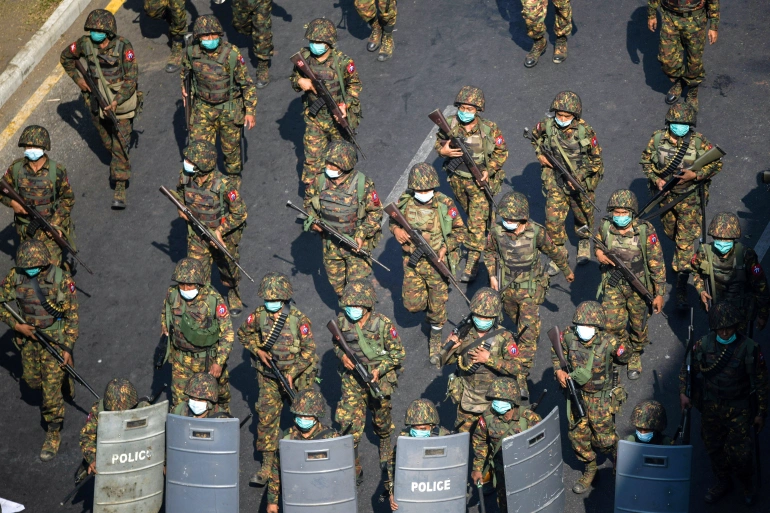MYANMAR : EXECUTING DISSENT
Chandra Muzaffar
The execution of four well-known democracy activists by the
military junta in Myanmar in June 2022 has angered and
incensed those who cherish freedom and justice all over the
world. The four , Phyo Zeyar Thaw, Kyaw Min Yu, Hla Myo
Aung and Aung Thura Zaw have become immortalised in the
noble struggle of the Myanmar people for their dignity and
humanity. By killing these peaceful dissenters, the junta has
in fact signed its own death warrant.
Since staging a coup against the democratically elected
government of the day, the National League for
Democracy(NLD), on the 1 st of February 2021, the Myanmar
military, the Tatmadaw, has become increasingly brutal and
desperate. It has killed more than a thousand five hundred
protesters including at least 44 children. It has detained
thousands more. Torture of detainees is rife and rampant.
Scores of people have disappeared.
Both the president, Min Nyint and State Counsellor, Aung San
Suu Kyi are in jail. So are the Ministers, deputy Ministers and
NLD members of parliament. Some civil servants, leaders of
civil society, a number of Buddhist monks and scores of men
and women from all walks of life are also behind bars.
The media is shackled. The Judiciary is totally subservient to
the junta. The universities are mere appendages of the
bureaucracy. All formal religious institutions are under the
dictates of the military elite.
Though Myanmar in the course of the last 60 years has
known brief periods of freedom, it has been in the grip of the
military most of the time since General Ne Win conducted a
coup against the civilian government in 1962. It is against this
backdrop that one should view the February 1 st 2021 coup
and the more recent execution of dissenters.
Given this tragic history of suppression and oppression, it is
remarkable that the flame of dissent has been kept alive for
so long in Myanmar. Even in the last two years since February
1 st , a lot of ordinary people have openly defied the junta
through actions such as the striking of pots and pans in
unison— a symbolic attempt to drive away evil — and
organising a silent strike on the first anniversary of the coup
this year which saw the closing of shops and the halting of all
outdoor activities as men, women and children stayed at
home. There have been even signs of a civil disobedience
movement developing in protest against the excesses of the
junta.
Even before the 2021 coup, in a situation where the military
was already flexing its muscles, it is remarkable that millions
of voters came out to support the NLD in the November 2020
election handing it a huge victory, 396 out of 476
parliamentary seats while the military backed party won only
33 seats. That was a dramatic expression of dissent within an
environment where military dominance was overwhelmingly
evident. Indeed, it is so obvious that it was because of the
NLD’s performance that the military elite conducted the coup
a few months later. The military elite knew that the people
had repudiated its rule, had rejected its ruthless power.
When a people have demonstrated so much courage, shown
such tenacity in the face of great odds, how should we as
their neighbours respond? Some ASEAN governments have
expressed unhappiness over the junta’s use of force against
peaceful protestors but on the whole the regional grouping
has refrained from advocating any punitive measures against
the junta in Myanmar. The time has come for ASEAN to
change its stand. As a collective it should now state explicitly
that executing dissenters is the ultimate act of violence and it
expects Myanmar to desist from such behaviour immediately.
If it does not, then ASEAN will suspend all military, economic
and educational ties with Myanmar. The same message
should go out to all other countries that currently interact
with Myanmar in these and other related spheres. Within
Asia, China and India are cases in point.
It will not be easy for a number of ASEAN states or for China
and India to act against Myanmar. They have often argued
that such action will only drive a wedge between them and
the ruling elite in Myanmar and it will become even more
difficult to persuade the latter to change its behaviour. They
forget that their present ‘soft’ stance has only encouraged
the Myanmar military elite to become harsher and even more
callous and cruel.
In this situation, civil society groups within ASEAN and Asia
and citizens in general in the continent should pressurise
their governments to act on the basis of fundamental moral
principles. To do otherwise is not only a betrayal of their
conscience but also a repudiation of those sacred values that
lie at the heart of the illustrious civilisations that constitute
our heritage.
Dr Chandra Muzaffar is the president of the International
Movement for a Just World (JUST).
Malaysia.
30 July 2022.

